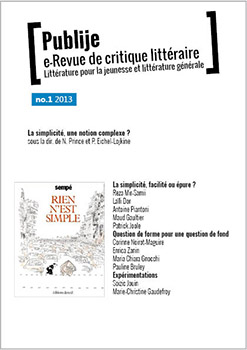Simplicité et fantaisie : Tristan Derème, poète médiocre ?
Mots-clés :
simplici, fantaisie, Derème TristanRésumé
Dès lors que le terme de simplicité est évoqué, il devient malaisé de ne pas explorer le faisceau sémantique qui s’en dégage et où l’on rencontre un éventail de sens parfois troublants : ainsi, aux significations relatives à la clarté, l’intelligibilité et la spontanéité se superposent progressivement celles d’aisance, de facilité, voire de médiocrité. Tout se passe comme si la notion était dotée d’une ambivalence telle qu’elle menace l’objet auquel on l’applique, fût-ce de façon bienveillante. Les poètes fantaisistes du début du xxe siècle, sans doute à cause d’une démarche anti-dogmatique et d’une volonté de rompre avec le sérieux d’un certain symbolisme, se sont exposés à ce reproche. On ne peut que rester circonspect devant le constat qu’établit Michel Décaudin : « La sympathie suscitée par les fantaisistes ne doit pas étonner. Sous les couleurs de la facilité aimable ces poèmes apportaient une réponse aux multiples problèmes contemporains. » (La crise des valeurs symbolistes : vingt ans de poésie française (1895-1914), Toulouse, Privat, 1960, p. 445). Cette réponse a-t-elle été bien entendue ? N’a-t-elle pas été brouillée par une réception qui s’est focalisée sur cette facilité déconcertante ?
Le cas de Tristan Derème peut nous aider à éclairer la question : prince de la fantaisie, il fut l’un de ses théoriciens cachés, mais son statut dans la critique de son époque et dans la recherche contemporaine le confine à la figure du poète mineur, dont la simplicité est devenue le symptôme d’un certain type de médiocrité. Il est fort probable que cette simplicité ne soit qu’apparente et qu’elle relève finalement, si ce n’est d’une stratégie esthétique, du moins d’un projet éthique qui replace le travail du poète dans un contexte ludique inattendu.
As soon as the term simplicity is mentioned it becomes difficult not to explore the semantic array thus yielded, within which one can find disturbing meanings ; thus, the meanings related to clarity, intelligibility and spontaneity are superimposed upon those of easiness, facility and even mediocrity. Everything happens as if the very notion was endowed with ambivalence that threatens the object which it defines, even when it is used in a positive way. The poètes fantaisistes of the beginning of the xxth century, undoubtedly because of an anti-dogmatic approach and the will to break with the seriousness of a certain kind of Symbolism, were exposed to that danger. One cannot but be circumspect when reading Michel Décaudin’s statement that : « we shouldn’t be surprised at the sympathy that the « fantaisistes » have received from readers, for under the appearance of an amiable facility the poems answered many of the problems of their time ». Has that answer been properly heard ? Hasn’t it been blurred by a reception which concentrated itself on that disturbing facility ?
The case of Tristan Derème can help us shed a new light on that question : the prince of fantaisie, he was one of its concealed theoreticians, yet the place he was assigned in the criticism of his time and that he has retained in contemporary academic research has restricted him to the role of the minor poet whose simplicity has become the symptom of a certain type of mediocrity. It is highly likely that this simplicity is deluding and that it finally derives, if not from an aesthetical strategy, at least from an ethical project which sets back the poet’s work in a ludic context.
Téléchargements
Publiée
Comment citer
Numéro
Rubrique
Licence
Les auteurs qui publient dans cette e-revue acceptent les termes suivants :
Les auteurs conservent le droit d'auteur et accordent à la revue le droit de première publication, sous la licence Licence d’attribution Creative Commons permettant à d'autres de partager les articles tout en en reconnaissant la paternité et la publication initiale dans cette revue.





